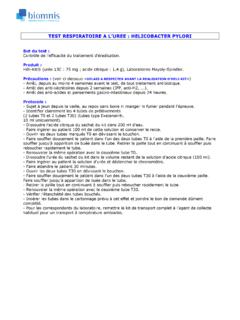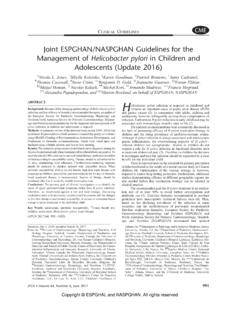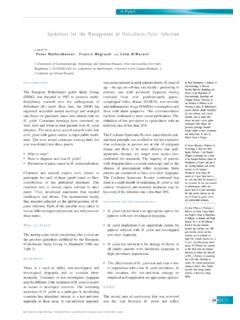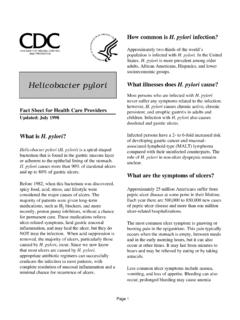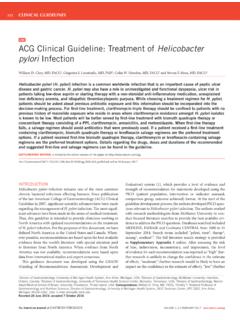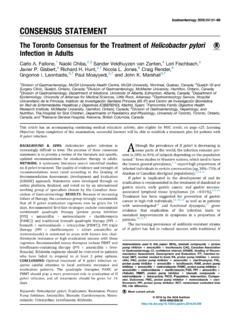Transcription of Review of the evidence for H. Pylori treatment …
1 118th Expert Committee on the Selection and Use of Essential Medicines (21 to 25 March 2011) Review Section (Antacids and other antiulcer medicines) -- Adults and children Review of the evidence for H. Pylori treatment regimens Dr Lennita Wannmacher OBJECTIVES The 17th Expert Committee on the Selection and Use of Essential Medicines recommended the inclusion of omeprazole as a representative of proton pump inhibitors (PPIs) in the Core Model List. It recommended a Review of antacids and histamine 2 receptor antagonists to assess their continued usefulness relative to PPIs in the Model List and a Review of treatment regimens for H. Pylori infections. This Review aims to recommend a protocol of H. Pylori eradication for adults and children, facing the contemporary evidence of its clinical benefit for some upper gastrointestinal diseases, and the choices (agents, formulations, concentrations) which could be maintained or added to the current WHO Model List of Essential Medicines, in its Section (Antacids and other antiulcer medicines, mainly comparing PPIs versus histamine 2 receptor antagonists).
2 Also a Review of the class of macrolides related to H. Pylori eradication was performed in order to decide the inclusion of another agent in the Section (Other antibacterials) of the same List, concerning its role in this context. METHODS Electronic searches of Medline, PubMed (using tools as Limits, such as publication date, any language, humans, meta analysis, randomized controlled trial), The Cochrane Library, and BMJ Clinical evidence , from 2005 to August 2010 were carried out, using search terms as H. Pylori infection, H. Pylori eradication therapy, proton pump inhibitors, histamine 2 receptor antagonists, macrolides, antibiotics, and probiotics. Additional references from identified articles were reviewed. Each article was screened for relevance and the full text acquired if determined to be relevant.
3 Each full text article was critically appraised regarding efficacy and safety in the treatment of H. Pylori infection. This Review excluded studies about efficacy and safety of theses medicines in other medical indications. BACKGROUND helicobacter Pylori is a gram negative bacterium found on the luminal surface of the gastric epithelium. It induces chronic inflammation of the underlying mucosa and usually infects the stomach in the first few years of life. H. Pylori can also colonize in human palatine tonsil tissues. The bacterium is not cleared by the body and the infection remains life long unless treated with antibiotics. At least 50% of the world s human population has H. Pylori infection. The great majority of patients with H. Pylori infection do not have any clinically significant complication.
4 However, H. Pylori infection is a cofactor in the development of three important upper gastrointestinal diseases: duodenal or gastric ulcers, gastric cancer and gastric mucosa associated lymphoid tissue (MALT) lymphoma. 1 2 H. Pylori is the main cause of peptic ulcer disease: 95% of duodenal and 70% of gastric ulcers are associated with helicobacter Pylori infection. A 1 to 2 weeks course of H. Pylori eradication with antibiotics and antiulcer medicines can accelerate the initial healing of duodenal peptic ulcers and has a significant benefit in preventing the recurrence of both gastric and duodenal ulcers once healing has been achieved. A Cochrane systematic Review of 57 trials showed that eradication therapy was superior to ulcer healing drug (UDH) (34 trials, 3910 patients; RR of ulcer persisting = ; 95% CI: ) and no treatment (2 trials, 207 patients; RR = ; 95% CI: ) in duodenal ulcer healing.
5 In gastric ulcer healing, no significant differences were detected between eradication therapy and UHD (15 trials, 1974 patients; RR = ; 95% CI: ). In preventing duodenal ulcer recurrence no significant differences were detected between eradication therapy and maintenance therapy with UHD (4 trials, 319 patients; RR of ulcer recurring = ; 95% CI: ), but eradication therapy was superior to no treatment (27 trials, 2509 patients; RR = ; 95% CI: ). In preventing gastric ulcer recurrence, eradication therapy was superior to no treatment (12 trials, 1476 patients; RR = ; 95% CI: ).2 In patients with bleeding peptic ulcers, antiulcer maintenance treatment was not necessary to prevent ulcer recurrence after successful H. Pylori eradication and ulcer healing, as demonstrated by a small (n=82 patients), 5 year, prospective, randomised, controlled Eradication of the infection provides a long term cure of duodenal ulcers in more than 80% of patients whose ulcers are not associated with the use of non steroidal anti inflammatory medicines (NSAIDs).
6 Nevertheless, a systematic Review of seven randomized controlled trials and one meta analysis showed that NSAID na ve users benefit from testing for H. Pylori infection and subsequent H. Pylori eradication therapy prior to the initiation of NSAID. In contrast, H. Pylori eradication is less effective than proton pump inhibitor (PPI) treatment in preventing ulcer recurrence in long term NSAID users. The meta analysis of five randomised trials (939 patients) that had compared H. Pylori eradication vs. non eradication or eradication vs. a proton pump inhibitor in patients receiving a non steroidal anti inflammatory agent confirmed the previous results. Peptic ulcer was developed in vs. (OR= ; 95% CI: ) of patients in the eradicated and control groups, respectively.
7 Sub analyses showed a significant reduction of risk for non steroidal anti inflammatory drug na ve users (OR = ; 95% confidence interval: ) but not for previously treated patients (OR = ; 95% CI: ). 4 A meta analysis of two studies (n= 385 NSAID users) compared eradication vs. a proton pump inhibitor in the prevention of peptic ulcer; developed a peptic ulcer in the eradicated group vs. 0% in the proton pump inhibitor group (OR = ; 95% CI: ).5 Also a Dutch randomised trial concluded that H. Pylori eradication therapy in patients on long term NSAID treatment had no beneficial effect on the occurrence of ulcers, erosions, or dyspepsia. 6 Peptic ulcer is the main cause for upper gastrointestinal haemorrhage, and H. Pylori infection is the main etiologic factor for peptic ulcer disease.
8 A Cochrane systematic Review of 10 trials (n= 1048 H. Pylori positive patients) compared the efficacy of H. Pylori eradication therapy versus antisecretory non eradication therapy (with or without long term maintenance antisecretory therapy) for the prevention of recurrent bleeding from peptic ulcer. treatment of H. Pylori infection was more effective than antisecretory non eradication therapy (without or with long term maintenance antisecretory therapy) in preventing recurrent bleeding from peptic ulcer. Mean percentage of rebleeding in H. Pylori eradication therapy group was versus 20% in the non eradication therapy group without subsequent long term maintenance antisecretory therapy (OR= ; 95% CI: ; NNT was 7; 95% CI: 5 to 11). The mean percentage of rebleeding in H.
9 Pylori eradication therapy group was versus in non eradication therapy group with 3long term maintenance antisecretory therapy (OR= ; 95% CI: ; NNT was 20; 95% CI: 12 to 100).7 helicobacter Pylori infection role in non ulcer dyspepsia is less clear. Most randomised trials of therapy for H. Pylori eradication in patients with non ulcer dyspepsia have shown no significant benefit regarding symptoms; a few have shown a marginal benefit, but this can be explained by the presence of unrecognized ulceration. There is thus little evidence that chronic H. Pylori infection in the absence of gastric or duodenal ulceration causes upper gastrointestinal To determine the effect of H. Pylori eradication on dyspepsia symptoms in patients with non ulcer dyspepsia, a Cochrane systematic Review included 18 randomised controlled trials.
10 There was a 10% relative risk reduction of dyspepsia symptoms at 3 12 months in the H. Pylori eradication group (95% CI: 6% 14%; NNT was 14; 95% CI: 10 25) compared to placebo. Furthermore three trials compared bismuth based H. Pylori eradication with an alternative pharmacological agent. These trials were smaller and had a shorter follow up but suggested that H. Pylori eradication was more effective than either H2 receptor antagonists or sucralfate in treating non ulcer Extensive epidemiologic data suggest strong associations between H. Pylori infection and non cardia gastric cancers. The risk of cancer is highest among patients in whom the infection induces inflammation of both the antral and fundic mucosa and causes mucosal atrophy and intestinal metaplasia.










